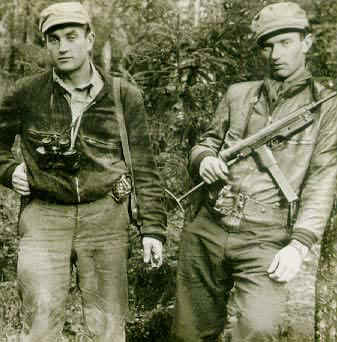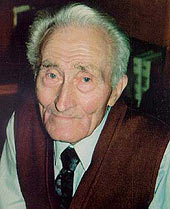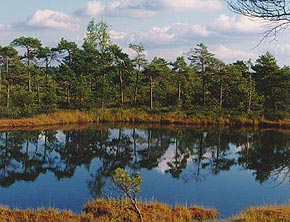|

The most hardened KGB trooper must have had second thoughts
about venturing too far into the forest to try and capture armed, angry men who had
nothing left to lose.
"On one hand, we were saving ourselves. But on the
other hand, we were also trying to save our country."
|
The Forgotten War
By Michael Tarm

The war, thank God, was over.
The task of reconstruction had begun. At last, after so many years of misery, people
across Europe were settling down to pick up the pieces of their shattered lives.
But not here.
And not Alfred Eerik.
Fifty years ago, as the rest of Europe was still
congratulating itself for beating off the Nazi menace, Eerik and thousands of others in
the Soviet-occupied Baltic states were hunkering down in the forest to fight for their
lives.
"They were saying World War II was over,"
explained Eerik, a sprightly, bright-eyed man of 8 6,
leaning forward on his apartment couch during a recent interview. "For us,
though, a new war was just beginning." 6,
leaning forward on his apartment couch during a recent interview. "For us,
though, a new war was just beginning."
It started in earnest when the Soviets marched into
Estonia, Latvia and Lithuania in 1944. Over the coming years, as Stalinist-style
repressions intensified, more than 100,000 Balts fled to the vast, wooded hinterlands to
hide.
They came to be known as forest brothers,
and they included cross-sections of society—everyone from farmhands to professors.
They had different reasons for being there: Some sought to save their skins as secret
police rounded people up for deportation; others formed well-organized partisan groups and
engaged Soviet forces in battle.
The bloody conflict that ensued as Soviet forces
endeavored to liquidate the woodland refugees lasted for more than a decade and cost at
least 50,000 lives. It is one of the forgotten chapters in the history of World War II and
its aftermath.
Alfred Eerik's story is typical.
Like so many others in the 1940s, Eerik, a brick
maker by profession, found himself between one rock and a hard place after another.
He spent most of the Nazi occupation from 1941 to
1944 trying to avoid being sent to the front by the Germans. As the Red Army drove out the
Nazis in 1944, he then spent most his time trying to avoid being sent to the front by the
Soviets.
As the Communists tightened their stranglehold,
younger men were in particular peril. If they couldn't adequately account for their
activities during German rule—and even if they could—they risked being executed
on the spot.
When the Red Army sent him a draft notice,
35-year-old Eerik joined the exodus into the forest.
Forests were a natural refuge. Throughout history,
for at least 1000 years, Balts had been retreating to the forests for protection from
foreign invaders.
At their most forbidding, Baltic forests are so thick
and impenetrable that they can appear to swallow up the daylight. It's easy to imagine how
even the most hardened KGB trooper might have had second thoughts about venturing too far
into the forests to try and capture armed, angry men who had nothing left to lose.
Eerik spent the next eight years in the forest. His
home was a cramped, inhospitable bunker fashioned from mud and stone. His sole luxury was
a portable shortwave radio, tuning in regularly to broadcasts from Voice of America's
Estonian service.
Elsewhere, bands of forest brothers organized attacks
against the new Soviet regime. In Lithuania, where resistance was best organized, armed
guerrillas effectively controlled whole regions of the countryside until 1949.
By ambushing Soviet patrols, wrecking power lines and
assassinating thousands of local party hacks, Baltic partisans—to put it
mildly—became a nuisance for the new Communist authorities. Consolidating Soviet rule
had become more bothersome and dangerous than Moscow had bargained for.
According to Eerik, most people living in the forest
worried more about how to stay alive than about how to kill Soviets. Few thought outright
confrontation would help liberate their homeland. Eerik and his forest comrades all had
guns, but never used them.
"It would have been folly to attack the mighty
Soviet army," he said. "We never even talked about it."
That said, Eerik argues that all forest brothers were
involved in resistance, whether or not they were actually fighting. They were, he insists,
all united by the same stubborn refusal to submit to Soviet rule.
"Being in the forest was clearly an act of civil
disobedience," he explained. "On one hand, we were saving ourselves. But on the
other hand, we were also trying to save our country."
It didn't seem to work.
Many forest brothers hoped that war would begin
between the Soviet Union and the West, and that this would lead to the liberation of the
Baltic states. That never happened.
According to Mart Laar, Estonian prime minister (from
1992-1994, and again from 1999) and author of a book on the post-war resistance, many
aging forest brothers still feel bitter that the West chose not to take the Soviets on
militarily.
"Nobody believed that Estonia would, for decades
and decades, be left in the hands of the Soviets," said Laar. "That wasn't even
a possibility. It's only a question of time, everybody thought. But after decades went by,
the idea about the West coming to their aid disappeared. The fight in the forest became a
personal thing. These people fought because they simply wanted to die as free men."
And die they did, at an alarming rate. By the early 1950s, Soviet forces had clearly gained the upper hand, and an average
forest brother could expect to stay alive for a year, maybe two. 1950s, Soviet forces had clearly gained the upper hand, and an average
forest brother could expect to stay alive for a year, maybe two.
For Eerik, the end came in 1953. By then, his wife,
fearing deportation herself, had joined him in the forest.
One fateful winter's day, their bunker in southern
Estonia was suddenly surrounded. Reluctantly, Eerik urged his wife to surrender to the KGB
troops outside, reasoning that at least her life would be spared.
As he slipped out a side entrance and fled for his
life on cross-country skies, he heard the rattle of gunfire behind him.
Further into the forest, he flung himself into a
ditch and waited, praying that pursuing ski patrols would just pass him by. The next thing
he knew, there was a rifle barrel nudged hard against his temple. He was caught.
"I thought, 'Okay, I'm being arrested, but, no
matter what, it's always better to be alive than dead,' " Eerik remembered thinking.
But that was before the interrogation. And that was
before he learned that the shots he heard earlier was the sound of troops spraying his
wife with machine gun fire.
"The interrogators beat me so hard," sighed
Eerik, shaking his head. "At that point, I wished I was dead."
After languishing in an Estonian prison for awhile,
Eerik was eventually given a 15-year jail term. Other so called enemies of the people
later had their sentences commuted. Forest brothers, however, served full terms. When
Eerik finally stepped out from behind the bars of his Siberian prison cell, it was 1968.
Decades later, sitting in his Pärnu, Estonia home,
Eerik complains that his fellow Estonians don't understand the sacrifices the forest
brothers made.
"Really, forest brothers should be considered
the pillars on which the state is being built," said Eerik softly, rubbing his worn,
wrinkled hands.
He speaks uncomfortably about heroics, casting his
eyes down and shifting uneasily in his chair. But pushed, he concedes that, yes, he does
believe the forest brothers were heroes.
"These people fought a war without a
battleground, and they went through water and fire to do it," he said. "I would
say we were heroes because we always kept our backs straight—we kept our
dignity."
Dignity costs. It cost Eerik his beloved wife, not to
mention 23 years of his life, from the time he went to the forest to the time he got out
of prison.
But Eerik says he harbors no bitterness about what he
went through. And he doesn't crave revenge.
He does, however, have one wish.
If he could, he'd like to rouse one of his KGB
interrogators from his grave—the one who so confidently proclaimed that Estonia would
never again be free.
"I'd want to give him a message," said
Eerik, his blue eyes gleaming. "I'd tell him, 'Look, look around you, the time of
independence did come back, and I am—once again—a free man.'"
—CITY PAPER-The Baltic States, 1996.
(Top photo is of two forest brothers in Lithuania; the photo is from the
KGB's archives.)
|
